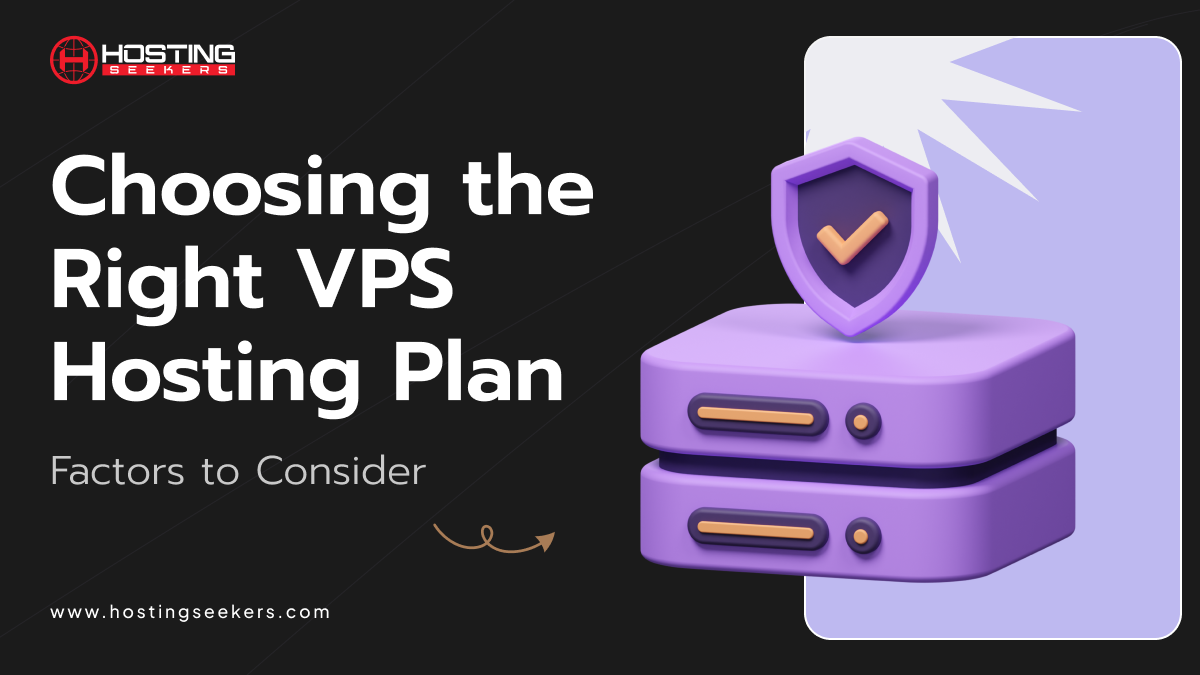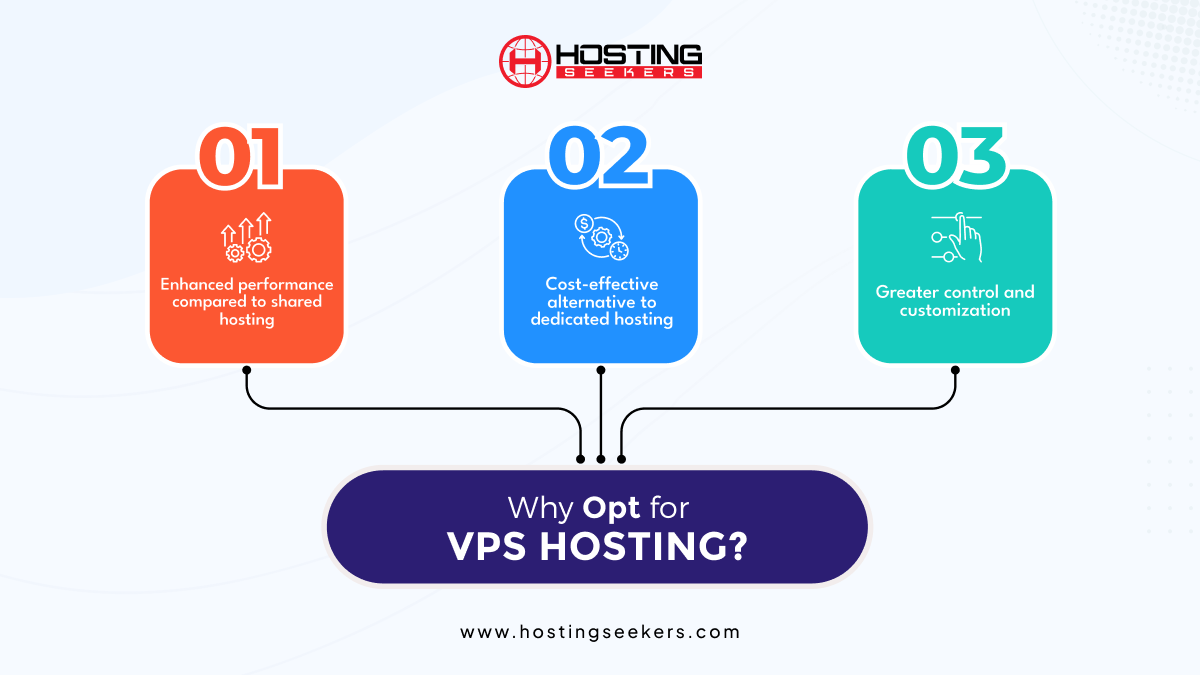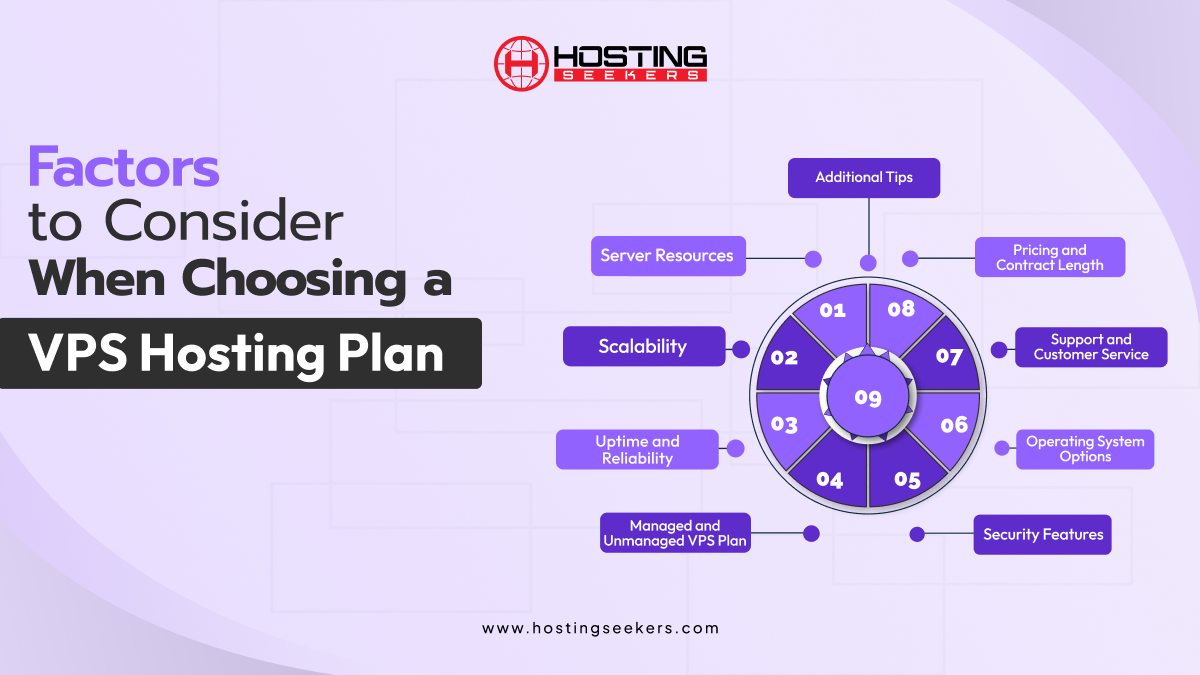
Choosing the Right VPS Hosting Plan: 9 Factors to Consider
VPS Published on Date: August 25th 2023Table of Content
Virtual Private Sector hosting has emerged as a well-known choice for its balance of customization, affordability, and performance. Whether you are running an eCommerce business, personal blog, or corporate website, the quality of VPS hosting plays a vital role in your site’s security, performance, and reliability. With the abundance of hosting options available, choosing the best VPS hosting plan becomes crucial as it may directly impact your site’s operational requirements. This guide focuses on the critical factions, enabling you to make informed business decisions with your long-term business goals.
What is VPS Hosting?
Virtual Private Servers (VPS) is a versatile and robust option that fills the gap between dedicated and shared Hosting. For instance, you can imagine a virtual plot of land within a larger digital landscape where you can shape and build your online presence per your requirements. VPS hosting offers your private server area divided into several virtual environments.
As per the market stats, the virtual private market is set to boost and is estimated to reach $8.3 billion by 2026. (Source: alliedmarketresearch.com) In addition, VPS hosting provides a cost-effective solution while ensuring enhanced security, performance and customization options. Let’s understand why you must opt for VPS hosting for your business.
Why Opt for VPS Hosting?
Virtual Private Server (VPS) hosting can capture attention for its unique advantages. When it comes to enhancing web performance, a VPS hosting plan offers a significant edge over shared Hosting. Also, in shared hosting environments, multiple websites share resources like processing power and memory, often leading to sluggishness during peak times. VPS hosting entirely changes this game, ensuring consistent responsiveness, speed and a smoother user experience.
Also, VPS hosting is a cost-effective middle ground, enabling you to enjoy the benefits of dedicated resources without the hefty cost tag. This makes it the best choice for businesses seeking exceptional performance without compromising their budget.
9 Factors to Consider When Choosing a VPS Hosting Plan
1. Server Resources
Server resources are the basic steps when choosing a VPS server plan for your business. Resources like RAM, CPU, Storage SSD, and bandwidth are crucial when selecting the best VPS hosting plan for your business. Let’s check the detailed breakdown;
a) RAM: RAM plays a crucial role in managing simultaneous tasks and ensuring smooth operations. Analyze your website’s challenges and traffic to decide how much RAM you need.
b) CPU: The CPU is the brain of your VPS server. The more powerful the CPU, the better it can manage resource-intensive processes and applications. It’s recommended to consider the task types of your website that will perform and choose a CPU that suits your needs.
C) Storage: Types of storage matter for both space and speed. SSDs (Solid State Drives) are faster and more reliable than Hard Disk Drives (HDD). Calculating your storage need is recommended depending on your website’s databases, content and future business growth.
D)Bandwidth: Bandwidth dictates how much data your server can transmit. Examine your website’s expected and current traffic, ensuring you have enough capacity to accommodate spikes without causing slowdowns.
2. Scalability
Selecting a VPS hosting provider that enables scalability is a strategic move. As your website gains visitors and traction, your hosting requirement may change. Always select a VPS hosting plan and providers that allow for easy upgrades or downgrades of your resources seamlessly as your requirements evolve. Therefore, look for a VPS hosting plan that can boost growth without needing a migration to a different hosting solution. This helps to prevent potential data loss and prevents disruptions.
3. Uptime and Reliability
When considering a VPS server plan, prioritize providers who offer a 99.9% uptime guarantee and boast multiple data centre locations with fewer redundancy concerns. These factors together contribute to your website’s stability, reliability and overall performance, fostering a positive user experience and maintaining your online reputation.
Meanwhile, the industry-standard benchmark for uptime guarantee is often set at 99.9%. This percentage corresponds to a maximum downtime of 8 hours and 45 minutes. At the same time, no hosting provider can guarantee absolute uptime due to unforeseen events, technical issues and maintenance. So, consider uptime and reliability guarantees when checking VPS server packages.
4. Managed and Unmanaged VPS Plan
When analyzing VPS hosting guide, one of the primary challenges you will face is whether to opt for a managed or unmanaged plan. Working VPS hosting plans provides convenience by handling many of the technical factors for you. This includes server maintenance, security updates, and troubleshooting setup. Managed hosting server plans are suitable for those who want to focus on their content website and growth without delving into server management.
Moreover, unmanaged VPS plans provide customization and greater control. Also, with this option, you will be responsible for security configurations, software installation and regular maintenance.
5. Security Features
When looking for VPS plans, security is another digital landscape; you need to pay attention to the security features offered by your hosting provider. Look whether your plan includes DDoS protection, firewalls, regular backups, and SSL certificates.
These security features ensure that your hosting provider mitigates the cyber threats and acts as a barrier between your server and potential threats, filtering out malicious traffic. In addition, look for regular backups vital for data recovery in case of unforeseen events. Select a hosting plan that provides regular automated backups and easy restoration options.
6. Operating System Options
Choosing the operating system (OS) for your VPS plays a crucial role in performance and compatibility. Most VPS hosting plans allow one to choose between Windows and Linux-based Hosting.
Linux-based VPS hosting is famous for its security, stability and cost-effectiveness. It is well-suited for a wide range of websites and applications. Moreover, Windows-based VPS hosting is favored by users who need compatibility with specific Windows-based software applications.
7. Support and Customer Service
Having robust and reliable customer support is vital for troubleshooting problems and maintaining a smoothly running website. Looking for a VPS hosting plan that provides 24/7 customer support and quick response time, as technical issues can arise at any time.
Research client testimonials and reviews to check the hosting provider’s average response time and their quality support.
8. Pricing and Contract Length
Considering and comparing budgets is crucial to balancing the cost with the feature you require. So, compare the parts in different plans against their cost to decide the best value for your budget. Also, look for additional fees and analyze the terms and conditions to avoid surprises. Moreover, consider the length of the hosting contract. While more extended warranties may offer cost savings, ensure you are comfortable with the commitment before signing up.
9. Additional Tips
- Importance of customer support.
- Check for a refund or money-back guarantee.
- Seeking feedback and reviews from existing
- Evaluating Backup and Disaster Recovery Plans
Final Thought
Are you ready to choose the right VPS hosting plan? With these factors and tips, you can make an informed decision. Remember, your hosting plan isn’t just about the technical aspects; it’s an investment in your digital venture’s security, performance, and growth. To select the best VPS hosting plan, check the best VPS hosting providers on HostingSeekers. Your journey to exception VPS Hosting today!

